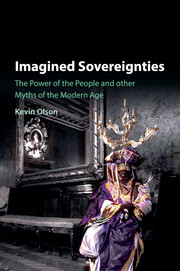Crossref Citations
This Book has been
cited by the following publications. This list is generated based on data provided by Crossref.
Bongie, Chris
2018.
A flexible quill: Abbé de Lahaye’s role in late colonial Saint-Domingue, 1787–1791 – the legend and the life.
Atlantic Studies,
Vol. 15,
Issue. 4,
p.
476.
2018.
Standard forms of power: Biopower and sovereign power in the technology of the US birth certificate, 1903–1935.
Constellations,
Vol. 25,
Issue. 4,
p.
641.
Beckman, Ludvig
2019.
Deciding the demos: three conceptions of democratic legitimacy.
Critical Review of International Social and Political Philosophy,
Vol. 22,
Issue. 4,
p.
412.
Müller, Viola Franziska
2020.
Runaway Slaves in Antebellum Baltimore: An Urban Form of Marronage?.
International Review of Social History,
Vol. 65,
Issue. S28,
p.
169.
Gorup, Michael
2020.
The Strange Fruit of the Tree of Liberty: Lynch Law and Popular Sovereignty in the United States.
Perspectives on Politics,
Vol. 18,
Issue. 3,
p.
819.
Elliott, Michael
2020.
Democratic opening and closure: Struggles of (de)legitimation in the settler colony.
Contemporary Political Theory,
Vol. 19,
Issue. 1,
p.
83.
GETACHEW, ADOM
2021.
A “Common Spectacle” of the Race: Garveyism’s Visual Politics of Founding.
American Political Science Review,
Vol. 115,
Issue. 4,
p.
1197.
Rousselière, Geneviève
2021.
Can Popular Sovereignty Be Represented? Jacobinism from Radical Democracy to Populism.
American Journal of Political Science,
Vol. 65,
Issue. 3,
p.
670.
Thomas, Peter D.
2021.
After (post) hegemony.
Contemporary Political Theory,
Vol. 20,
Issue. 2,
p.
318.
Lee, Chungjae
and
Liou, Stacey
2022.
Inverted founding: Emperor organ theory, constitutionalism, and koku-min.
European Journal of Political Theory,
Vol. 21,
Issue. 2,
p.
345.
2022.
Ugly Freedoms.
p.
207.
Balampanidis, Ioannis
Katsambekis, Giorgos
Iliadis, Christos
and
Papataxiarchis, Evthymios
2022.
Ambiguous identities in crisis-ridden Greece: ‘us’ and/against ‘Europe’.
Journal of Contemporary European Studies,
Vol. 30,
Issue. 4,
p.
640.
2022.
Ugly Freedoms.
p.
181.
2022.
Ugly Freedoms.
p.
113.
2022.
Ugly Freedoms.
p.
1.
Yuen, Samson
and
Kan, Karita
2022.
Of Mad Cows and Dead Pigs: Negotiating Food Safety and Everyday Sovereignty in Taiwan.
Geopolitics,
Vol. 27,
Issue. 5,
p.
1552.
2022.
Ugly Freedoms.
p.
148.
Jenne, Erin K.
2022.
Varieties of Nationalism in the Age of Covid-19.
Nationalities Papers,
Vol. 50,
Issue. 1,
p.
26.
2022.
Ugly Freedoms.
p.
37.
2022.
Ugly Freedoms.
p.
77.



